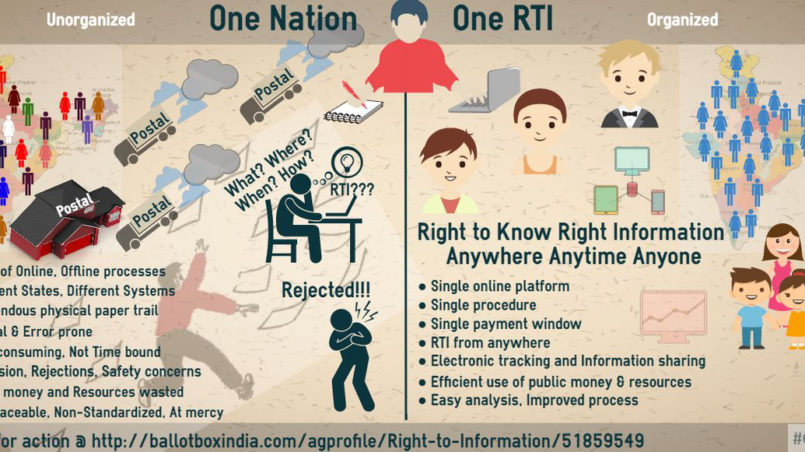Right to Information in India

One of the most heated debates between citizens and government in the contemporary time concerns growing government surveillance and the concomitant violation of privacy rights. In fact, it is no wonder that surveillance is now present in ways that we don’t even expect or can imagine. And, such surveillance is carried out and justified on the grounds of national security. However, with growing knowledge and understanding of the complex network and expanse of government surveillance, activists as well as citizens are now involved in discussions and debates on the balance between liberty and security.
However, the citizens and government of India are engaged in a debate which is diametrically opposite to the issue of surveillance. Here, the concern is more about vigilance. Many Indian citizens and activists are working to make efficient and meaningful laws such as the “Right to Information Act”, which will enable citizens to receive information about the government. But the government is trying to muzzle vigilante efforts by its citizens.
The Right to Information (RTI) Act is considered a landmark achievement in empowering citizens of India, against opacity maintained by government bodies. In fact, it is hailed as milestone legislation by the Indian Parliament, which provides Indian citizens with the right to request information from any “public authority“, i.e. any government body within India. Under this Act, the concerned government body is obliged to reply to any request for information within thirty days. As a result, government bodies are required to computerize their records and information, so that citizens can have easy access to the requested information about government activity.
According to the CLD, the rankings are based on various parameters of the Act and include right of access, scope, requesting procedures, exceptions and refusals, appeals, sanctions and protection and promotional results.
In India, the RTI Act is the result of an arduous campaign started in Maharashtra by social and civil rights activist, Anna Hazare. Hazare argued that all government representatives and officials like bureaucrats, police, etc, are public servants and therefore are accountable to the citizens of India. Hazare initially campaigned and pressed for an Act for Right to Information in the state of Maharashtra of India. The first campaign for the same was organized in Azad Maidan, Mumbai in 1997, and on August 9, 2003, Hazare went on a hunger strike in order to exert pressure on the Maharashtra state government to pass the Act. On the 12th day of Hazare’s hunger strike, the Government of Maharashtra got the bill signed by the President of India and enacted the Right to Information Law in Maharashtra. Subsequently, the Law was passed in the Indian Parliament and came into force throughout the country in 2005.
There is no doubt that, as a result of the implementation of the RTI, more transparency has been achieved in the way government officials function and it has led to the abolition of the culture of secrecy. This, in turn, has helped in enhancing accountability, predictability, and rule of law in government bodies. The RTI is, in fact, a tool for good governance and development as an aware and informed citizenry does not only lead to participatory governance but can also contain corruption.
Indeed, the RTI has proven its ability to check corruption and create accountability in the past, as many high profile scams were uncovered by the RTI. Furthermore, it has also has led to a reduction in corruption in public services like food security programs, health programs and other such programs intended for the weaker sections of society. However, several attempts have also been made to water down and subvert the Act’s provisions through various amendments.
Other than being a tool of good governance, I believe the RTI is no less than a civil right for Indians. Civil rights can be defined as an expansive and significant set of rights that are designed to protect individuals from unfair treatment and discrimination. Or in other ways, civil rights are the rights of individuals to receive equal treatment.
Most Indians dread the idea of having to go to government offices and get their work done. It is actually an arduous task to get work done in government offices in India because it involves standing in queues and waiting for hours, days or even months to get even simple work done, such as getting a signature from some senior official on some document. On top of that, there is no guarantee that one’s work will be done. The complacency of officials, as well as work overload, are just a couple of reasons for such a state of affairs.
People in India are often frustrated with the way work is done in government offices but feel helpless in changing the situation. People are also often not even informed on what grounds their request or applications have been rejected by the public body. The RTI is a tool which can be craftily used in all of these situations and government officials can be made to answer for their conduct and decisions. However, I feel dejected to find that only a small percentage of people are aware of their right to inquire about a public body in such situations.
A huge part of the population in India are still unaware of the RTI or do not know how to deal with the procedures. Only the educated and even amongst the educated, only informed citizens are aware of the RTI and the power bestowed by it on citizens. Therefore, one can easily claim that the RTI which facilitates vigilance by citizens of government functioning has not yet been able to achieve its purpose. And irrespective of the fact that access and requesting procedures in the RTI Act is quite simple, people have yet to make use of it.
Credits
| Image | Title | Author | License |
|---|---|---|---|
 |
Right_to_Information_(RTI_Act_2005)_-_One_RTI_Campaign | Saachith | CC BY-SA 4.0 |
